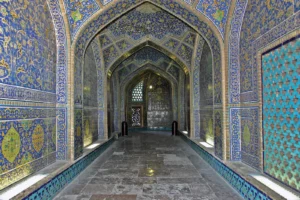
If one asks the average American, who are the Qizilbash people, the average American won’t know what you are speaking about. They will say the “Qizil what?” And then, if you ask them about the connection of the Qizilbash people to Azerbaijan, the average American will ask you how to spell Azerbaijan and ponder where it is on the map. However, the average American should learn a little bit about who the Qizilbash people are if they seek to understand the history of modern-day Azerbaijan, Iran, Central Asia, Afghanistan, the regions of strategic value to the United States of America.
Recently, the State Committee on Work with the Diaspora, a government agency of Azerbaijan, held an event titled “the Heritage of the Qizilbash in Azerbaijan: in the footsteps of history,” which sought to raise awareness about the Qizilbash people, who are an association of Turkic nomadic tribes that speak the Azerbaijani language. These tribes included the Rumlu, Shamlu, Ustajlu, Afshar, Qajar, Tekelu, and Zulkadar. From the 15th century onwards, these tribes contributed to the foundation of the imperial Azerbaijani Dynasty of Safavids that originated in Azerbaijan and ruled over a big part of the Near and Middle East.
The Azerbaijani Safavid Dynasty or the State of Qizilbash which was its other denomination, was the first Twelver Shia Empire in modern-day Iran. Because of the Safavids, Iran today is Shia and not Sunni. However, the Safavids were not primitive like the mullahs in Tehran are today. The Iran under Azerbaijani Safavids was an economic stronghold between East and West who had an efficient state bureaucracy based upon checks and balances. They created great architectural landmarks and patronized the fine arts. Under their role, Turkic and not Persian influence was dominant. The State language was Azerbaijani as well as military and ruling elite consisted of Azerbaijani Qizilbash tribes. Indeed, it was only from the Pahlavi Dynasty onwards that Turkic identity in Iran was repressed rather than celebrated.
The conference that was held in Azerbaijan sought to raise awareness about the roots and identity of the Qizilbash and to promote communication that can lead to the reunification of the global community of Qizilbash, like it existed at the time of the Azerbaijani Safavid Empire. “Azerbaijan is doing great work to unite the Qizilbash people,” former federal secretary of Pakistan, Board member of the Qizilbash Global Heritage Organization Agha Sarwar Raza stated. “Our ancestors lived on the territory of Azerbaijan. Subsequently, they spread to different countries. Azerbaijan is our motherland.”
In a joint statement, the members of the Qizilbash Global Heritage Organization, co-organizer of the conference, stated: “We, members of the Qizilbash Global Heritage Organization which is part of the world Qizilbash community, feel proud to note that the Qizilbash movement which emerged in the second half of the 15th century opened a new page in the history of the Near and Middle East and the Turkic world on the whole. During the reign of the Safavid state founded by the Qizilbash tribes which incorporated present-day Azerbaijan, Armenia, Dagestan, Iran, Iraq, Eastern Turkey, Eastern Georgia, Southern Turkmenistan and Western Afghanistan and in the subsequent years notably during the conquest of Nadir Shah Afshar, a great figure in world military history, the Qizilbash made a stronghold in these areas thus having eventually spread to different parts of the world.”
They continued by “stressing the importance of this international conference as a great beginning in the wider study and promotion of Qizilbash heritage which appears to be a glorious page in the history of Azerbaijan. In a broader sense, we perceive this significant event as a historical step marking organized and purposeful activities towards the appropriation by Azerbaijani people and state of its glorious historical heritage.” On another note, the Qizilbash Global Heritage Organization “expressed our faith in the sustainability of activities on a broader scale and format towards strengthening the bonds of the world Qizilbash with their historical homeland and their return to their historical roots and support future efforts of this kind.”
The Qizilbash Global Heritage was established in Canada in order to help Qizilbash from across the world to reconnect with their roots, coordinate their joint activities, to be introduced to the Azerbaijani language and culture, and to integrate them into Azerbaijani society. Arshi Qizilbash, the deputy chairman of the Qizilbash Global Heritage Organization, stated that the goal of the organization is to grow and take their organization to the United Nations and UNESCO for recognition as a world heritage organization.
By Rachel Avraham